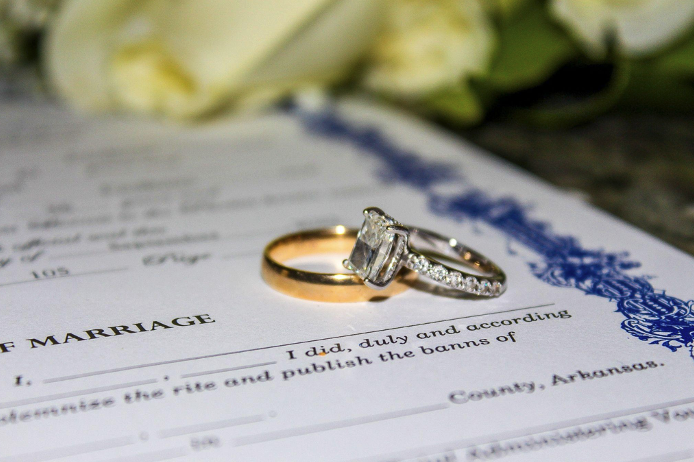
With all of the steps that go into planning a wedding, it can be easy to miss one of the most important steps – securing a marriage license, and, eventually, a marriage certificate. It’s important to note that every state does have differing rules when it comes to securing your marriage certificate, so make sure that you pay attention to any specific rules that you will need to follow to finalize your marriage in your state.
Below, we tell you the difference between a marriage license and a marriage certificate, and how to obtain each of these essential marriage documents.
A marriage license is a document issued by the county that you are marrying in, and it states your eligibility to marry. In order to obtain a marriage license, you and your future spouse will need to bring documents showing your identity to the courthouse or county clerk’s office in your area. This will need to be done weeks before the official wedding, as some counties and states do not let couples marry within a certain time period after requesting their marriage license.
Once you have completed your marriage license request, you will receive this document to be signed on your wedding day in front of the officiant and a witness. Upon signing the document, you will mail it or return it to the county clerk’s office or courthouse to be filed, and you will receive your marriage certificate.
Applications for marriage licenses are rarely denied, as most couples applying for marriage licenses have already taken the steps to get to know each other and are ready for marriage. In most normal circumstances, a marriage license won’t be denied, no matter who applies for it.
That being said, if the county courthouse or clerk’s office determines that the couple is closely related in any way, one party is not of legal marrying age, or one party is not mentally capable of consenting to marriage, the marriage license application is likely to be denied.
In order to legally finalize your marriage and make it official in the county, you need both a marriage license and a marriage certificate. The marriage license is the initial document that you will sign at your wedding. Upon mailing this signed document in, you will receive your marriage certificate in return.
If you want a marriage certificate, which all couples need to be legally married in their state, you will first need a marriage license. You will request your marriage license from the local courthouse or county clerk’s office. You can only get your official marriage certificate after you return your signed marriage license to the appropriate court office; your marriage certificate will be mailed back to your address or available for pickup in person once the marriage license has been processed. To ensure that the address you have provided is accurate, you can use an address search lookup to double-check details.
Marriage certificates do come with a cost, as this is the cost of obtaining the document and having your marriage license processed. In most states, the cost of a marriage certificate will be anywhere between $10 and $30; you will need to check directly with the county clerk’s office to learn more about what marriage certificates in your area cost.
It’s not possible to get married without a marriage license, as the marriage license is the document that permits you to marry your future spouse in your county and state. Without a marriage license, you can still have the ceremony and reception part of your wedding, but your marriage will not be legally recognized by your state.
You must have a marriage license, and subsequently, a marriage certificate, in order for your marriage to be legal and for you and your spouse to receive all of the benefits that being married brings.
Figuring out the difference between a marriage license and certificate can be confusing at first, but it’s important to understand these two documents and how important they are to your marriage. You must first have a marriage license before you can obtain your marriage certificate, and you should check with the county courthouse or clerk’s office directly if you have any questions about the specific state rules for obtaining your marriage license and certificate.